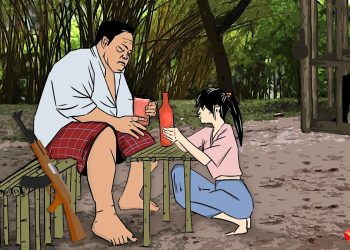CHIANG MAI, THAILAND — Ethnic representatives from the United Nationalities Federal Council (UNFC) and various domestic and international advisors gathered to discuss security issues and Burma’s peace process in northern Thailand’s Chiang Mai this week.
Titled “Security, Defense and Current Political Situation Workshop,” the three-day event was organized by the Ethnic Nationalities Affairs Centre (ENAC), an organization focused on providing training and drafting policy that will support Burma’s peace process.
Khu Oo Reh, the general secretary of the UNFC—a coalition of 11 ethnic armed groups (EAOs)—said on Tuesday that the workshop was held in preparation to present collective policies on each sector at a future political dialogue. Khu Oo Reh is also the secretary of ENAC’s board of directors.
The leaders in the workshop explored different approaches to security sector reform (SSR) and disarmament, disintegration and reintegration (DDR) processes from other countries, such as Nepal and Northern Ireland.
“The discussion helps us to think best [about] how to transform and integrate the armed groups during Burma’s transition period, but not by copying [the others’] ways,” said Khu Oo Reh.
Eight armed groups signed the government’s so-called nationwide ceasefire agreement (NCA) in October 2015, including UNFC members the Chin National Front and the Pa-O National Liberation Organization. The two groups’ membership of the alliance was subsequently suspended.
“We will share our draft policies with the EAOs to get approval and recommendations from them before the political dialogue [continues], so that we will have a common vision when the time comes for the talks,” said Khu Oo Reh.
The alliance has said they are also ready to work with the new National League for Democracy (NLD)-led government, but an official channel for talks between the UNFC and the NLD has yet to form.
Since its formation in 2013, ENAC has been providing a series of workshops and trainings for civil society and EAO leadership on issues concerning politics, economics, land rights, humanitarian aid, resource governance and security.
Leaders participating in this week’s workshop emphasized the need for such policy talks, noting that Burma’s public has been denied the opportunity to participate in decisions regarding education, health, investment and the environment due to the lack of a federal system.
Sai Nyunt Lwin, general secretary of the Shan Nationalities League for Democracy (SNLD) and a member of ENAC’s board of directors, said that future policy briefings would have to be shared with local civil society groups.
Awareness of the peace process, he said, is the most significant issue after that of the government’s transfer of power.
“Peace building is not only talking about signing the ceasefire with the various armed groups. It also has to be creating peace, stability and rule of law in the country,” he told The Irrawaddy.

















